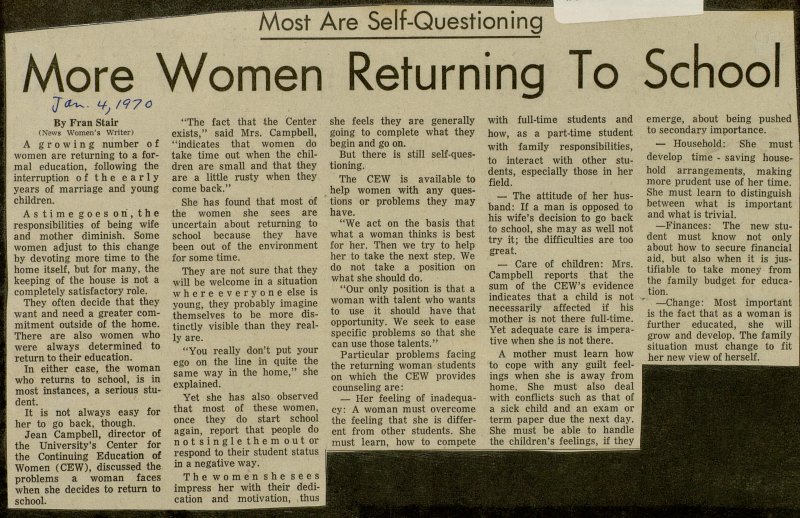More Women Returning To School

A growing number o f women are returning to a formal education, following the interruption of the early years of marriage and young children. As time goes on, the responsibilities of being wife and mother diminish. Some women adjust to this change by devoting more time to the home itself, but for many, the keeping of the house is not a completely satisfactory role. They often decide that they want and need a greater commitment outside of the home. There are also women who were always determined to return to their education. In either case, the woman who returns to school, is in most instances, a serious student. It is not always easy for her to go back, though. Jean Campbell, director of the University's Center for the Continuing Education of Women (CEW), discussed the problems a woman faces when she decides to return to school. "The fact that the Center exists," said Mrs. Campbell, "indicates that women do take time out when the children are small and that they are a little rusty when they come back." She has found that most of the women she sees are uncertain about returning to school because they have been out of the environment for some time. They are not sure that they will be welcome in a situation where everyone else is young, they probably imagine themselves to be more distinctly visible than they really are. "You really don't put your ego on the line in quite the same way in the home," she explained. Yet she has also observed that most of these women, once they do start school again, report that people do not single them out or respond to their student status in a negative way. The women she sees impress her with their dedication and motivation, thus she feels they are generally going to complete what they begin and go on. But there is still self-questioning. The CEW is available to help women with any questions or problems they may have. "We act on the basis that what a woman thinks is best for her. Then we try to help her to take the next step. We do not take a position on what she should do. "Our only position is that a woman with talent who wants to use it should have that opportunity. We seek to ease specific problems so that she can use those talents." Particular problems facing the returning woman students on which the CEW provides counseling are: - Her feeling of inadequacy: A woman must overcme the feeling that she is different from other students. She must learn, how to compete with full-time students and how, as a part-time student with family responsibilities, to interact with other students, especially those in her field. - The attitude of her husband: If a man is opposed to his wife's decisión to go back to school, she may as well not try it; the difficulties are too great. - Care of children: Mrs. Campbell reports that the sum of the CEW's evidence indicates that a child is not necessarily affected if his mother is not there full-time. Yet adequate care is imperative when she is not there. A mother must learn how to cope with any guilt feelings when she is away from home. She must also deal with conflicts such as that of a sick child and an exam or term paper due the next day. I She must be able to handle the children's feelings, if they emerge, about being pushed to secondary importance. - Household: She must develop time - s a ving household arrangements, making more prudent use of her time. She must learn to distinguish between what is important and what is trivial. - Finances: The new student must know not only about how to secure financial aid, but also when it is justifiable to take money from the family budget for education. - Change: Most important is the fact that as a woman is further educated, she will grow and develop. The family situation must change to fit her new view of herself.